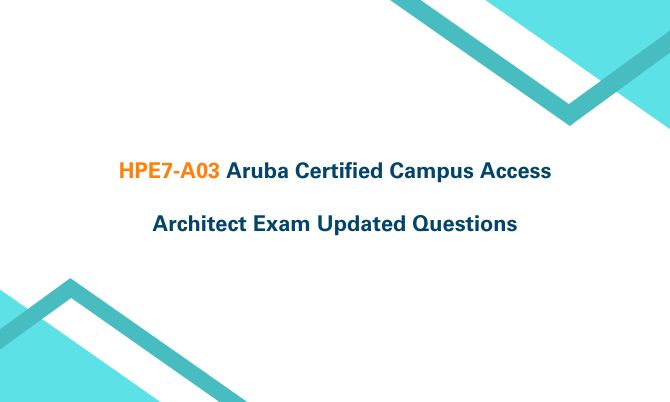The HPE7-A03 Aruba Certified Campus Access Architect exam validates your comprehensive ability to design secure, redundant, scalable, and resilient HPE Aruba Networking Campus Access infrastructures. This certification is crucial for IT professionals who aim to create high-performing network solutions that align with both business needs and technical requirements. By proving your expertise in these areas, you demonstrate your capability not only in designing robust and efficient network architectures but also in ensuring their seamless integration and operation within diverse business environments. Earning this certification underscores your commitment to excellence in the field of network architecture and enhances your professional credibility, making you a valuable asset to any organization seeking to optimize its network performance and security.

Exam Type: Proctored
Duration: 2 hours 30 minutes
Number of Questions: 70
Passing Score: 67%
Delivery Languages: English, Japanese, Latin American Spanish
The HPE7-A03 exam tests your capability to translate complex requirements into optimal HPE Aruba Networking solutions. The exam covers four main domains, each with specific objectives:
Discover Requirements (21%)
Define the Goals: Establish the primary goals of the network project.
Identify the Current Environment: Recognize any constraints that may affect the project.
Identify the Objectives: Clarify what the project aims to achieve.
Collect Information: Gather all necessary information relevant to the project.
Analyze Requirements (26%)
Determine Possible High-Level Solutions: Identify potential solutions that meet the project requirements.
Map the Requirements into Technical Solutions: Translate the project requirements into technical solutions.
Evaluate the Proposed Solution: Assess the proposed solution against known dependencies and project objectives.
Document Assumptions: Record any assumptions made during the analysis.
Architect the Solution (32%)
Identify Solution Options: Determine solution options that fulfill business needs.
Design High-Level Topologies: Create high-level network topologies.
Select the Correct Products: Choose the appropriate HPE Aruba products.
Determine the Appropriate Overlay and Underlay Design: Plan the overlay and underlay network design.
Validate the Design: Ensure that the design meets the original requirements.
Propose the Solution (21%)
Create Design Documentation: Develop comprehensive design documentation.
Present the Solution: Effectively communicate the solution to stakeholders.
Create the Final Design: Finalize the design based on feedback and validation.
Understand the Exam Objectives: Thoroughly review each objective and ensure you understand the underlying concepts and requirements.
Study HPE Aruba Validated Solution Guides: Familiarize yourself with HPE Aruba's validated solution guides, which provide insights into designing robust network solutions.
Hands-on Practice: Gain practical experience by working on real-world network design projects or simulations.
Use Updated Real Questions: To prepare effectively for your upcoming exam, utilize the updated HPE7-A03 real questions provided by Testpassport. These comprehensive resources will help you understand the material thoroughly and increase your chances of success.
Join Study Groups and Forums: Engage with other candidates and certified professionals to share knowledge and study tips.
Achieving the HPE7-A03 Aruba Certified Campus Access Architect certification demonstrates your ability to design and implement sophisticated network solutions using HPE Aruba technologies. This certification not only validates your technical skills but also highlights your understanding of the latest industry standards and best practices. By mastering the exam objectives and preparing diligently, you can confidently showcase your expertise and contribute significantly to any organization’s networking needs. Additionally, obtaining this certification can enhance your career prospects, opening up new opportunities for professional growth and advancement within the field of network architecture and design.